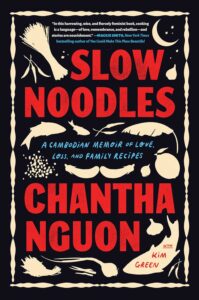“Slow Noodles” by Chantha Nguon is more than just a cookbook. It’s a poignant memoir woven through with the comforting aroma of traditional Cambodian cuisine. Nguon’s narrative seamlessly blends personal anecdotes of family, love, and loss with detailed recipes, creating a deeply moving and flavorful journey.
The book delves into Cambodia’s turbulent history, from the Khmer Rouge regime to the struggles of refugees finding new homes. Nguon’s personal experiences, including the tragic loss of her parents, are interwoven with the history of her country, offering a powerful and intimate perspective.
Chantha Nguon’s Slow Noodles is an intimate and beautifully woven memoir that blends personal stories of survival, resilience, and love with the comfort and tradition of Cambodian family recipes. It is a poignant journey that captures the essence of Cambodian culture while honoring the author’s experiences during the Khmer Rouge era.
While the book features a collection of authentic Cambodian recipes, from classic dishes like *nom banh chok* (Khmer noodles with fish sauce) to lesser-known regional specialties, it’s much more than just a culinary guide. Each recipe is accompanied by personal reflections, evoking memories of family gatherings, cultural traditions, and the enduring power of food to connect us to our past.
Through the act of cooking and sharing these cherished family recipes, Nguon explores themes of healing, resilience, and the enduring power of love and community. “Slow Noodles” is a testament to the human spirit’s ability to find solace and strength in the face of adversity.

Story and Themes
The memoir unfolds in two intertwined layers: a deeply personal account of Nguon’s life and a collection of traditional Cambodian recipes passed down through generations. At its heart, Slow Noodles is about healing—through food, family, and the act of storytelling. The title itself serves as a metaphor for the patience and care required to rebuild lives and preserve traditions after immense loss.
Nguon explores universal themes of love, loss, and identity while painting a vivid picture of Cambodia’s turbulent history. The juxtaposition of harrowing wartime memories with the warmth of food and family creates a narrative that is both heartbreaking and uplifting.
Recipes and Cultural Insight
The recipes scattered throughout the book are not just culinary instructions but cultural artifacts that tell their own stories. From fragrant bowls of kuy teav (Cambodian noodle soup) to traditional desserts like num ansom (sticky rice cakes), each recipe is accompanied by anecdotes and reflections on their significance in Cambodian life. These recipes are accessible to readers of all skill levels, making the memoir not only a deeply personal narrative but also an invitation to explore Cambodian cuisine.
Writing Style
Nguon’s writing is lyrical and evocative, seamlessly blending poetic descriptions with raw emotional honesty. Her ability to capture the sensory details of both food and memory makes the book come alive. The narrative moves fluidly between past and present, creating a tapestry of experiences that feels authentic and immersive.
- Strengths
Emotional Depth: Nguon’s storytelling is heartfelt and moving, offering a glimpse into the resilience of the human spirit. - Cultural Richness: The book provides a window into Cambodian traditions, history, and the role of food in community and healing.
- Practicality: The inclusion of recipes allows readers to engage with the memoir on a tangible level, connecting with the culture through cooking.
Weaknesses
- Narrative Pacing: The memoir occasionally lingers too long on certain anecdotes, which can slow the momentum of the overall story.
Focused Perspective: While deeply personal, the book doesn’t delve as much into the broader sociopolitical context of Cambodia, which some readers may expect given the historical backdrop.
Slow Noodles is a heartfelt and flavorful memoir that captures the essence of Cambodian culture and resilience. Chantha Nguon’s ability to weave her personal narrative with the rich traditions of Cambodian cuisine makes this book a feast for both the mind and the soul. It’s a must-read for anyone interested in Southeast Asian culture, food, or stories of triumph over adversity.
Why You Should Read It:
Food Lovers: If you’re passionate about exploring diverse cuisines and learning to cook authentic dishes, this book is a must-have.
History Buffs: Nguon provides a unique and insightful perspective on Cambodian history, offering a personal and moving account of the country’s struggles.
Those Seeking Connection: The book explores themes of family, loss, and healing, resonating with readers who are looking to connect with their own heritage and find meaning in their lives.
“Slow Noodles” is a heartwarming and insightful read that will leave you craving both the delicious food and the profound sense of connection it evokes.